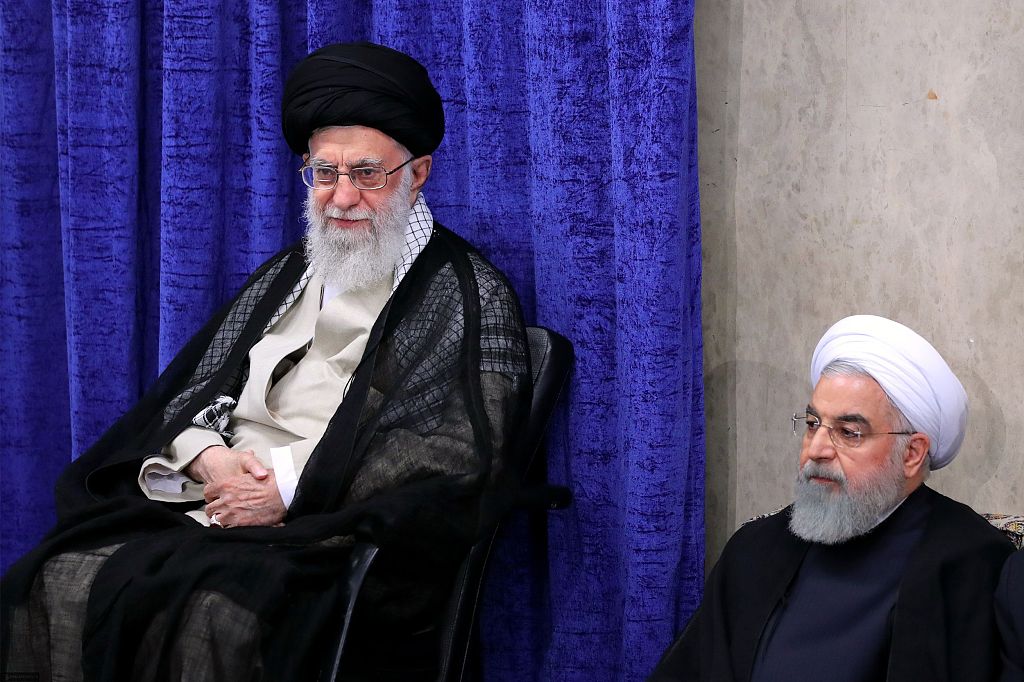War with Iran irrational for US
- By Mitchell Blatt
 0 Comment(s)
0 Comment(s) Print
Print E-mail China.org.cn, May 22, 2019
E-mail China.org.cn, May 22, 2019

If George Santayana were alive today, he would be sad to see how right he was. Are we forgetting history? American foreign policy makers, it seems, cannot even remember the defining events of their own lifetimes and decisions they were personally involved in making just less than two decades ago.
Once again, a potential "pre-emptive" war beckons in the Middle East, and a leading United States senator is saying an American victory would be quick and easy. This time, the potential target is Iraq's neighbor, Iran.
The Trump administration has been saber-rattling on Iranian issues since day one, and its level of threats have progressively heightened. Iran hawks like John Bolton were appointed to national security positions, the U.S. broke the nuclear deal with Iran, sanctions were threatened, and now the U.S. is grasping at straws to find any possible justification for war. To anyone who has observed politics play out in their lifetimes, this is like a horror movie playing in slow motion. We know the ending, and it isn't pretty.
The latest flimsy pretext is a set of apparent attacks carried out on four oil tankers, none American, which resulted in no reported casualties. Tankers operated by the Saudis, Emiratis, and Norwegians sustained damage. Anonymous U.S. government sources claimed the attacks were carried out by the Houthis, the group currently in charge of Yemen's capital and which is locked in a war with Saudi Arabia, potentially with the encouragement of Iran. A spokesman for the Houthis did claim credit for a drone strike on a Saudi oil pipeline.
Iran, however, has denied any involvement. While it has historically supported the Houthi movement, because they share aligned interests, experts say Iran's current level of operative involvement with the Houthis is limited or non-existent. So the U.S. is now raising the prospect of war over low-level attacks on non-American assets that Iran doesn't even appear to have been behind.
To put things in perspective, the Houthis and the Yemeni people are being bombarded daily by Saudi bombing campaigns, with supplies and operational help that have been provided by the U.S. Thousands of civilians have been killed and yet the attention of the U.S. is focused on the damage to the tankers.
Trump stated in response to a question about the incident, "It's going to be a bad problem for Iran if something happens." Whether this is a legitimate threat or just more of the kind of sound and fury we have become used to from Trump – potentially an attempt to ratchet up pressure on Iran – it remains dangerous. Even if he "does not seek a war" (Secretary of State Pompeo's words), this kind of bluster does increase the likelihood of miscalculations.
The idea that the U.S. could somehow get a "better" deal than the one the six countries (the U.S., the U.K., Russia, China, France and Germany) and the European Union negotiated while united in purpose over years is far-fetched. In his May 2018 speech "A New Iran Strategy," Pompeo called Iran to end many of its national defense strategies unrelated to nuclear activity. Iran's continued testing of its ballistic missiles (which are only tangentially related to nuclear activity as missiles can be used for conventional warfare too) and its backing of militant groups like Hezbollah must be stopped, he said. The U.S., Saudi Arabia, and other countries with perceived interests in the region have all supported militant groups in the Syrian Civil War. In short, Pompeo is demanding Iran cease the foreign policy activities that its adversaries continue to engage in. It's clearly a demand Iran would never agree to and one that does nothing to advance the anti-nuclear proliferation agenda.

Now Iran has suggested that parties should work together to renegotiate a deal. Iran warned that if they do not do so, it will resume some of the previous uranium enrichment activities it had ceased in compliance with the old deal. Will Trump take Iran up on its offer? The best case scenario is that the world goes back to the table less united than before and ends up with a worse deal than before. If this happens, the U.S. would have wasted years of negotiating and threats.
Back to recent history. In September 2003, U.S. Vice President Dick Cheney said on national television, "My belief is we will, in fact, be greeted as liberators," and around the same time, Donald Trump thoughtlessly nodded along when asked if he supported the war. The U.S. struggled to cobble together an international coalition, sent a fraction as many troops as necessary to secure the country, had no plan for addressing insurgency or rebuilding, and the Department of Defense even froze the State Department out of the process. Now, not long after, Cheney is still criticizing the Iran deal. The U.S. once again has no international support for its position, not even among its traditional allies. The Trump administration in the meantime has been hollowing out the State Department and doesn't trust its advice.
One difference, however, is that the Iranian military is much larger than the Iraqi military was in 2003, and Iran covers 3.5 times as much land mass. A war with Iran would be worse.
David Frum, one of the Bush administration officials involved in the Iraq War, wrote in "The Atlantic" last week, "The idea of repeating such a war, only on a much bigger scale, without allies, without justification, and without any plan at all for what comes next staggers and terrifies the imagination."
If only there were more people who could learn from their mistakes.
Mitchell Blatt is a columnist with China.org.cn. For more information please visit:
http://www.china.org.cn/opinion/MitchellBlatt.htm
Opinion articles reflect the views of their authors, not necessarily those of China.org.cn.






Go to Forum >>0 Comment(s)